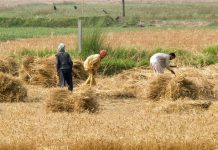
LAHORE: Rating agency Moody’s released an assessment report on climate change Tuesday saying Pakistan’s resilience to it was limited.
The report entitled “Credit profiles of small, agriculture-reliant sovereigns most susceptible to climate change risk” said out of Sri Lanka and India, Pakistan’s credit profile was particularly susceptible with 44% of the labour force dependent on agriculture, which represents 25% of GDP.
“Rising temperatures and erratic rainfall can affect productivity in agriculture and increase the vulnerability of energy production, as 33% of Pakistan’s energy supply are hydropower-driven,” said Moody’s.
“With very low fiscal strength and a low GDP per capita, the country’s resilience to climate change is limited. Despite the susceptibility to climate change and its potential impact on agriculture, the country has experienced robust GDP growth of about 5%, supported by strong performance in the agricultural sector and increased China-Pakistan Economic Corridor related investment. Pakistan’s large economic and geographic size imply that natural disasters are unlikely to have country-wide impacts.”
Moody’s said “of the 36 sovereigns whose credit quality is identified as most susceptible to climate change, 17 are in Africa, 12 in Asia Pacific. A common characteristic is their economic reliance on the agricultural sector (44% of employment and 19% of value added on average), which is typically not irrigated and is thus rainfed. Conditions in the agriculture sector drive food security, spending power and growth in other sectors.”






